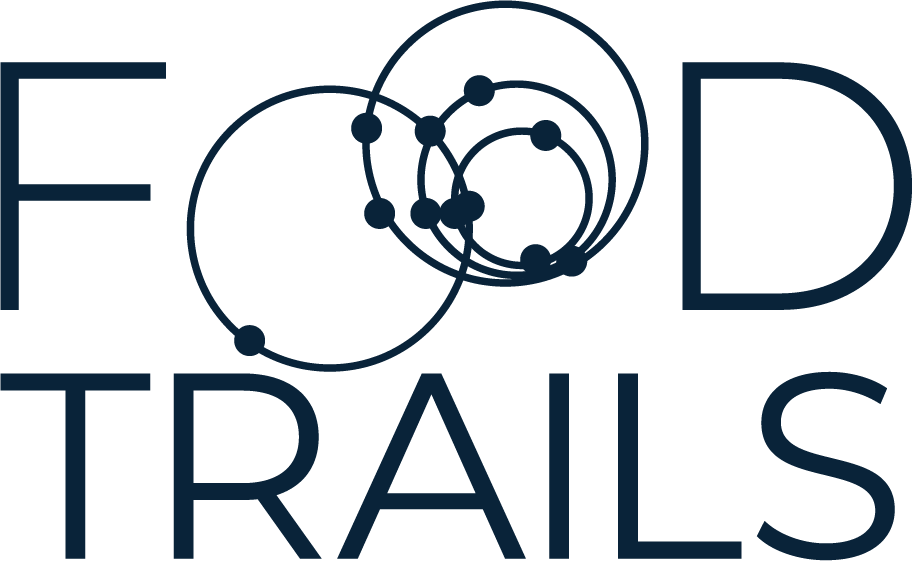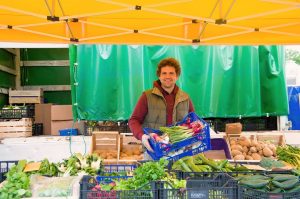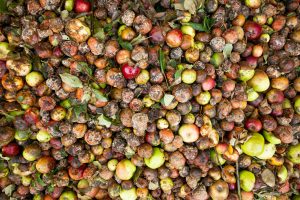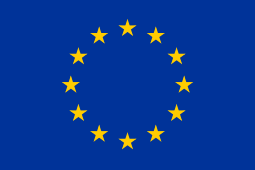Last Monday, 20 March 2023, Eurocities and the Milan Urban Food Policy Pact concluded the #EUFoodCities campaign with a Twitter Space conversation between Anna Scavuzzo, Vice Mayor in charge of Food Policy and Education at the City of Milan and Anja Katalin de Cunto, Head of the Food Team at Eurocities. They discussed the future of urban food policies, how cities can contribute to the transformation of food systems and the upcoming EU food policy.
You can read the full conversation below.
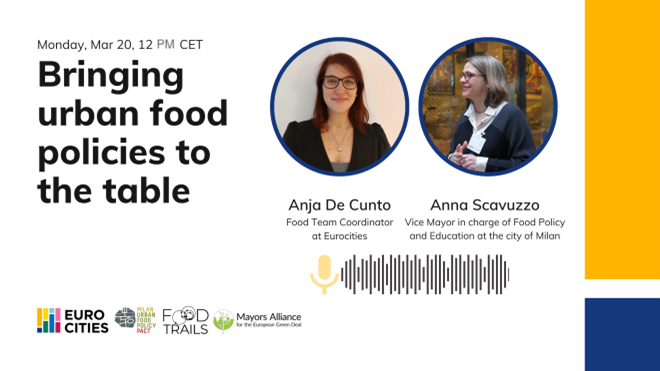
Wilma Dragonetti: Good morning, and welcome to “Bringing urban food policies to the table”, a discussion about how cities can contribute to food system transformation and EU food policy. I am Wilma Dragonetti, Communication Specialist at Eurocities, and I’m joined today by Anna Scavuzzo, Vice Mayor in charge of Food Policy and Education at the City of Milan. Good morning, Anna.
Anna Scavuzzo: Good morning.
Wilma Dragonetti: And by our very own food policy expert, Anja Katalin de Cunto, Head of the Food Team at Eurocities, good morning, Anja.
Anja De Cunto: Good morning.
Wilma Dragonetti: For those who have not followed our latest developments, this conversation is the last action of the #EUFoodCities campaign and a follow-up to the event “Bringing urban food policies to the table”. The event gathered 11 deputy mayors and 8 representatives from the European Commission to discuss the upcoming Sustainable Food Systems Framework Law, which the European Commission is preparing. Eurocities and the Milan Urban Food Policy Pact (MUFPP) launched the campaign and organised this event to raise the profile of the work that cities are already doing on food policies and to call for higher ambitions at the EU level.
Eurocities and the MUFPP have worked on the event and the campaign for the past several months. Why organise such an event?
Anna Scavuzzo: Eurocities and the MUFPP have organised this high-level event to link EU policymakers with cities’ political representatives. One reason was to increase awareness around the effort of cities and draw attention to their critical role in shaping our food systems.
It was the occasion to bring together policymakers, experts, and city representatives to discuss and share best practices and solutions for building resilient and equitable food systems. Additionally, the event occurred at a key moment when the European Commission is thinking about a common food policy. This is why we worked on a public campaign and an in-person event in Brussels.
As you mentioned, the event came at a key moment; Anja De Cunto, can you tell us more?
Anja De Cunto: This Autumn, the European Commission will put forward the proposal for a legislative framework for sustainable food systems. This is one of the flagship initiatives of the Farm to Fork Strategy. Its goal is to give the framework for action to facilitate the transition towards more sustainable food systems for Europe and will therefore impact a number of future legislation at different levels of governance.
Eurocities and the MUFPP organised this campaign and the event of 9 March to join the conversation on how such a comprehensive policy should look and share cities’ perspectives. We have discussed, among other things: successful models of multilevel governance, the strategic role of public procurement, the work of cities on food environments, and how food councils can link different food actors for successful policy co-creation.
Do you think the event succeeded?
Anna Scavuzzo: I believe we are very proud of having organised this event because cities’ voices should be considered when designing the future of the EU food system. The European Commission representatives gave us extremely positive feedback on the work we showcased. We need to keep pushing to make our voice heard. It was a huge milestone.
Eurocities and Milan have been collaborating on food policies for some time now; how did it start?
Anna Scavuzzo: Since 2015, the launch of the MUFPP and the launch of the Food Policy have given impetus to the activities that the Municipality of Milan carries out at the European level to promote a new role of cities in the definition of sustainable food systems. Milan is active in exchanging good practices with other European cities and in the advocacy work with the European Commission.
The launch of the MUFPP subsequently supported, in 2016, the creation of the Eurocities Working Group Food, chaired by the Municipality of Milan in cooperation with Warsaw.
The Working Group is carrying out intensive work to promote food policy within European institutions. Every year cities meet, hosted by different members of the Working Group, to share the latest updates and common approaches.
How has the work evolved, and what does it look like today?
Anja De Cunto: Until now, the Eurocities Working Group Food has mainly focused on sharing and exchanging good practices for which there is much need as urban food policy is still something new for many cities. We gather online and organise physical meetings around different work areas, for example, on the collaboration with wholesale markets, urban-rural linkages, and food aid solutions.
Thanks to the support of EU-funded projects like Food Trails, we are now testing and developing new solutions in cities and gathering solid evidence to support evidence-based policy at the EU and national levels.
Now, to speed up and deepen urban food transformation, we need to encourage both the EU and the national level to support and empower cities to act upon food.
Let’s get practical: Anna Scavuzzo, can you give me an example of what a city like Milan can achieve by working on food policy?
Anna Scavuzzo: Milan has achieved interesting results thanks to its vision of the local food system.
We launched our food policy in 2015, a city-wide initiative to promote sustainable food practices in five thematic areas and foster collaboration between stakeholders in the food system.
Thanks to this strategic decision, we studied our system and gained a better understanding of the potential for impact.
We lowered food waste levels thanks to several initiatives, like the food waste hubs.
We shifted our public procurement for school canteens to be more sustainable and reduced by 42% our GHG [greenhouse gas] emissions linked to it.
We created a strong and powerful network of stakeholders where each one has a role and a specific task, and the municipality coordinates and guides the process.
At the event, more cities showcased their work. Could you share a few more inspiring examples?
Anja De Cunto: The event and the campaign have gathered examples from several cities across Europe, from metropolitan areas to small and medium-sized cities, and from many EU countries. We wanted to demonstrate the variety of actions around food which are not limited to the work in public canteens.
Bordeaux Metropole, for example, is focusing on supporting their farmers in moving towards agroecological solutions and preserving land while at the same time promoting a short food supply chain and local food production and consumption.
Warsaw is focusing on food recovery and streamlining their actions for food aid solutions which are being exacerbated by the Ukrainian refugee crisis.
Thessaloniki has put economic development at the centre of its work and has launched the first food council of Greece, linking it with its work as UNESCO creative city of gastronomy.
As we already mentioned, the European Commission is working on a Legislative framework for sustainable food systems. For those who might not be familiar with it, could you summarise why it is important?
Anja De Cunto: While the EU has been working on a common agricultural policy since the beginning, for the first time, the Commission is trying to move towards a common food policy.
The legislation will provide common definitions and detail the common principle of a sustainable food system.
For cities, there are specific opportunities around governance and the inclusion of minimum food procurement criteria, which could go beyond green public procurement.
At the same time, the EU waste directive is being revised. This includes provisions around food waste, with a potential target of a 50% reduction in food waste by 2030.
How would such legislation support cities?
Anna Scavuzzo: It’s important and interesting for cities because it sets a framework for cities’ actions, which is lacking. Cities also lack the resources and tools to go the extra mile and advance food systems transformation and multilevel governance.
The legislation will also clarify responsibilities and represent a great opportunity to anchor local food policies into clear multilevel governance and to foster partnerships with national and EU levels.
It integrates procurement in the discussion, and cities like Barcelona or Copenhagen are leading the way on the kind of goals we could set for menu shift and responsible sourcing.
It also integrates food waste, and, as a city particularly active on this with our food waste hubs and food waste reduction initiatives in schools, we see the opportunities coming from common targets on this issue.
Food governance locally would also be recognised in all the member states as an official area of work.
So, there are some good opportunities in this proposal for cities. Are there other aspects of food you would like to see being addressed at the EU level?
Anja De Cunto: We would like to see more links with other key EU initiatives, like the FOOD2030 and its ten pathways for actions, which supports cities with funding for innovation and is providing key evidence on the role of city-regions food systems and short supply chain.
We also need to reconsider the role of cohesion funding for food policies at the regional and local levels. We would like better to link rural, social, and regional development funds to work on food policies across all their dimensions. This would also allow going beyond some considerations in the current political debate that sees a divide and almost a competition between rural and urban areas.
Anna Scavuzzo: I would like to see a link between the Sustainable Food System framework law and the Rural Development Programme, to create funding opportunities for cooperation among urban, peri-urban and rural actors. As we did in Milan with ‘Measure 16,’ to establish a project to connect local production and procurement for school canteens.
There could also be a link with the EU child guarantee and the work for vulnerable youth and children, specifically on the right to a healthy and nutritious school meal and the possibility of using funds for public school canteens.
Now that the campaign is ending and the event is behind us, what are you taking home to Milan?
Anna Scavuzzo: Further emphasis and support should be granted to cities’ work on food, as they play a decisive role in shaping food systems.
National food action plans can be important to anchor local food policies in a multilevel governance process.
Public procurement is one of the key tools for cities. The introduction of minimum mandatory criteria can facilitate further work on food systems.
EU and national funding for urban food innovation provide valuable resources to advance many food-related aspects at the local level.
What are the next steps?
Anna Scavuzzo: European cities can benefit from a system of urban food policies and common goals in this field. So, we need some key discussions to continue after this fruitful event.
It was super important to have a face-to-face exchange with key people involved in the process.
We also agreed on sharing good practices from cities with the European Commission to give sound evidence to the experts drafting the Sustainable Food System Law.
Anja De Cunto: It is clear that there is still a big knowledge gap around the work cities are taking around food, which many think is limited to procurement. We will look for future opportunities to present their work across Europe and showcase the variety of actions, for example, on urban and peri-urban food production, linking with start-ups and SMEs, and the work on healthy food environments.
A future opportunity will be the upcoming Urban Agenda for the EU focusing on food, an initiative of the European Commission DG REGIO, which will look at better funding, better policies, and better knowledge around food.
Finally, we will keep supporting capacity building. For example, we will meet in Ghent at the end of April to discuss successful actions and policies for protein transition and how we support locals to consume a more plant-based diet.
And one more question from the audience. Elisabetta Luzzi asks: Do you think the support of a not only technical but also financial partner like the Cariplo Foundation is mandatory for the success of an urban food policy?
Anja De Cunto: It is not fundamental to see a successful food policy, but it does support the scale-up of activities and ambitions which can go beyond the use of the public budget. In Food Trails, we are developing an investors’ living lab. You can find out more at the Food Trails webinar this Thursday, 23 March, at 15.00 CET.
Wilma Dragonetti: This is a captivating and complex subject, and I’m sure we could continue discussing it for several more hours, but I have to bring this conversation to an end. Anna Scavuzzo and Anja Katalin de Cunto, I want to thank you both for joining me today and sharing your experience and perspective on the future of urban food policies.
Anja De Cunto and Anna Scavuzzo: Thanks
Wilma Dragonetti: For cities which would like to know more and get involved, please follow the MUFPP, get in touch with Anja for the Eurocities work on food, or check out the Food Trails project website. Thank you for listening to us. Goodbye.
